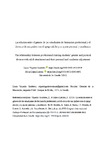La relación entre el género de los estudiantes de formación profesional y el divorcio de sus padres con el apego adulto y su ajuste personal y académico

View/
Use this link to cite
http://hdl.handle.net/2183/34751Collections
- Investigación (FFISIO) [497]
Metadata
Show full item recordTitle
La relación entre el género de los estudiantes de formación profesional y el divorcio de sus padres con el apego adulto y su ajuste personal y académicoAlternative Title(s)
The relationship between professional training students’ gender and parental divorce with adult attachment and their personal and academic adjustmentDate
2023Citation
Viqueira Gutiérrez, L. & López-Larrosa, S. (2023). La relación entre el género de los estudiantes de formación profesional y el divorcio de sus padres con el apego adulto y su ajuste personal y académico. En M. Peralbo, A. Risso, A. Barca, J.C. Brenlla, B. Duarte, L. Almeida y A. Cruz-Santos, A. Eds.), Actas del XVII Congreso Internacional Gallego-Portugués de Psicopedagogía (pp. 658-671). Servicio de Publicaciones de la Universidad de A Coruña.
Abstract
[Resumen] El divorcio tiene consecuencias negativas para los hijos que pueden perdurar en la edad adulta. El género se relaciona con las dimensiones académicas y motivacionales del alumnado de Formación Profesional (FP). Los objetivos de esta investigación eran analizar la relación entre el género de jóvenes estudiantes de FP y el hecho de que sus padres estuvieran o no divorciados con variables como el apego adulto y el ajuste personal y académico. Participaron 103 estudiantes españoles de FP, 43 hombres (41.7%) y 60 mujeres (58.3%). Sus edades oscilaban entre los 18 y los 25 años (media = 19.94 años, DT = 1.94). Los instrumentos utilizados fueron el Cuestionario de Apego Adulto, con las subescalas de Baja Autoestima, Resolución Hostil de Conflictos, Expresión de Sentimientos y Autosuficiencia Emocional, y las subescalas de Adaptación Personal-emocional y Académica del Student Adaptation to College Questionnaire (SACQ). Se hallaron relaciones significativas entre la baja autoestima y el divorcio. Los estudiantes cuyos padres estaban divorciados presentaban una autoestima más baja que aquellos cuyos padres no estaban divorciados. Hubo relaciones significativas entre la resolución hostil y la autosuficiencia emocional y el género. Los hombres tenían una media más alta que las mujeres en resolución hostil y en autosuficiencia emocional. Pero, no se hallaron diferencias significativas entre la adaptación personal-emocional y la adaptación académica según el género o si los padres estaban divorciados, tampoco la interacción género-divorcio resultó significativa. Los resultados podrían contribuir a la comprensión de la influencia que el divorcio tiene sobre los hijos, incluso en la juventud temprana, así como la relación entre el género y el apego adulto. [Abstract] Divorce has negative consequences for children that can persist in adulthood. Gender relates to both the academic and motivational dimensions of professional training students. The objectives of this research were to analyse the relationship between professional training students’ gender and parental divorce, with variables such as adult attachment and personal and academic adaptation. Participants were 103 Spanish professional training students, 43 males (41.7%) and 60 females (58.3%). Their ages ranged between 18 and 25 years old (mean = 19.94 years, SD = 1.94). The Adult Attachment questionnaire, with the subscales Low self-esteem, Hostile conflict resolution, Expression of feelings and Emotional self-sufficiency, and the Personal-emotional and Academic adaptation subscales of the Student Adaptation to College Questionnaire (SACQ) were used. There were significant relationships between low self-esteem and divorce. Students whose parents were divorced had lower self-esteem than those whose parents were not divorced. There were significant relationships between hostile resolution, emotional self-sufficiency and gender. Males had higher means in hostile resolution and emotional self-sufficiency than females. But, there were not significant relationships between the personal-emotional and academic adjustment and participants’ gender or parental divorce, neither there were gender-divorce interaction effects. The results could contribute to the understanding of the influence that divorce has on children, even in young adulthood, as well as the relationship between gender and adult attachment.
Keywords
Apego
Auto-estima
Hostilidad
Emocional
Familia
Attachment
Self-esteem
Hostility
Emotional
Family
Auto-estima
Hostilidad
Emocional
Familia
Attachment
Self-esteem
Hostility
Emotional
Family





